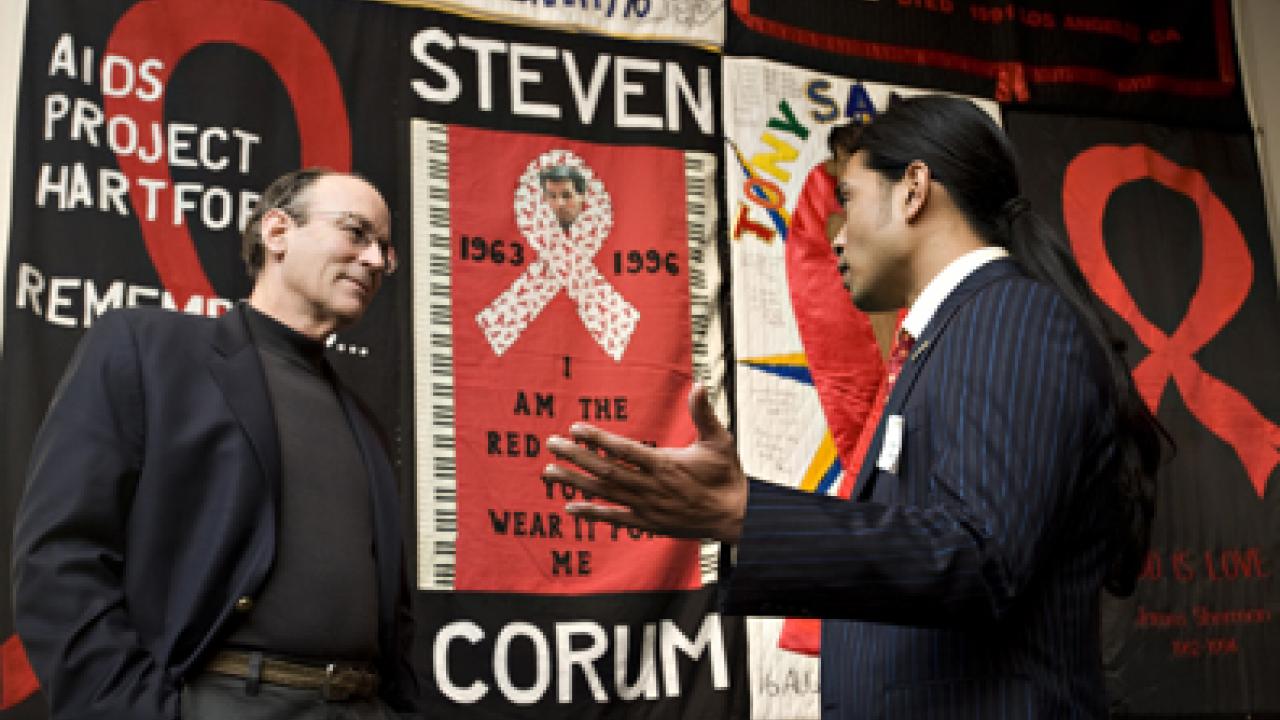It was no easy task writing this book on Paul Farmer’s goodness.
Farmer is the man who, in the early 1980s, before beginning his studies at Harvard Medical School, started doing clinic work in impoverished Haiti, focusing on tuberculosis and AIDS. Since then, and seemingly without sleep, he has expanded his good deeds around the world.
Pulitzer Prize-winning author Tracy Kidder, in writing about Farmer, worried that people might look upon the story as a kind of Hallmark card that was too good to be true.
On top of that, “He forces us to think about problems we’d rather not think about,” like the poor state of health care in Haiti, one of the poorest nations in the world.
Kidder wrote the book anyway, publishing it in 2003. Mountains Beyond Mountains: The Quest of Dr. Paul Farmer, A Man Who Would Cure the World would become a New York Times best-seller, and UC Davis selected it as the Campus Community Book Project for 2008. The project finished up last week with the author’s visit to campus for a forum, a writing workshop and a formal address.
In his evening address Dec. 1, which drew nearly 1,300 people to the Mondavi Center’s Jackson Hall, Kidder told how six years elapsed between the time of his and Farmer’s first meeting and when Kidder started his book in earnest.
“I just knew that if I started to follow this guy around, he’d disturb my peace of mind—and he did.”
Kidder joined Farmer on Haiti’s central plateau, and traveled with him to such places as Moscow’s Central Prison and the Carabayllo slum on the outskirts of Lima, Peru. “He showed me more reasons for despair than I’d ever imagined,” Kidder said.
And yet, “it was exhilarating to see what a small group of people could do,” Kidder said, as they confronted great pandemics that are destroying whole societies.
In the end, Kidder said, he became sold on Farmer’s organization, Partners in Health, and today serves as a fund-raiser when asked. He noted his participation in a recent auction in Boston, where someone paid $120,000 to accompany Farmer on a trip to Haiti, whereas Kidder said he was a “cheap date” by comparison: auctioned for $35,000 to a book group.
“It’s a shameless attempt to promote a vision I believe to be true,” he said.
But make no mistake, Kidder said. He spent days and weeks at a time with Farmer, working hard to find flaws in his character and mission, even joining him on an 11-hour trek to make a house call, or, in Farmer’s case, a “hut call.”
Then, in writing his book, Kidder inserted himself into his story more than he normally would, to show how he had acted as “a foil to my improbable main character.”
What he found, Kidder said, was a man who “deep down, had discovered what he really liked to do, and that is being a doctor.”
He described Farmer as having an “incredible” knowledge of infectious diseases. And while books may have been helpful during medical school, he does not rely on them now. “He remembers his patients,” Kidder said, their circumstances and diagnoses and treatments in painstaking detail.
He showed before-and-after photos of some of those patients. First there was Alcante, a Haitian boy who looked to be nothing more than skin and bones, near death from TB at the age of 11.
Conventional wisdom said the boy could not be saved, Kidder said. But, he added, “Farmer was born with a constitutional aversion to conventional wisdom.” So he started Alcante on an inexpensive regimen of medicine.
It worked, and “here’s the proof,” Kidder said as he showed a second photo of Alcante, a smiling picture of health.
Partners in Health not only saved Alcante, but provided his family with a better home—still a hut, but one with a concrete slab instead of dirt for a floor, and a tin roof.
“This is what Haitian peasants have been asking for—a life of dignified poverty,” Kidder said.
Next came a photo of a Haitian man suffering from TB and AIDS, which Kidder said is “unfortunately horrifyingly common in the world today.”
Partners in Health treats both, relying on a cadre of community health workers from the native population to visit patients daily to ensure they are taking their medicines.
“And they work,” Kidder said, once again declaring, “Here’s the proof,” as he showed a picture of the Haitian man looking happy and healthy.
Julie Jacobs, a retired physician from Fairfield, came to Kidder’s speech as an admirer of his writing, especially his insight into ordinary people.
But Farmer, she said, is no ordinary person. Jacobs said she worked in migrant labor camps, “and it wrings your heart out in a couple of days.”
Farmer, she said, “has been doing it for 30 years.”
On the Net
Media Resources
Dave Jones, Dateline, 530-752-6556, dljones@ucdavis.edu
